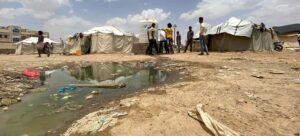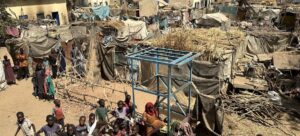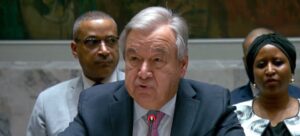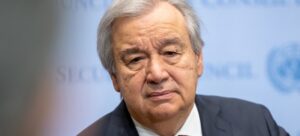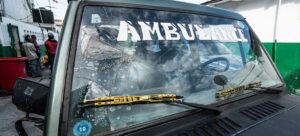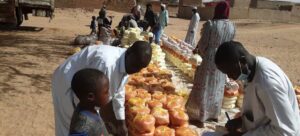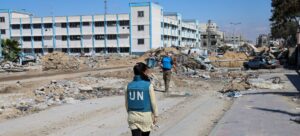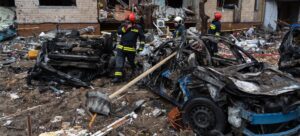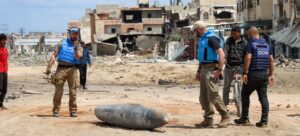“It is vital to avoid any action that could lead to major military confrontations on multiple fronts in the Middle East…Now is the time for maximum restraint,” the UN Secretary-General told delegates at the opening of an emergency meeting of the UN Security Council.
Mr. Guterres explained that the emergency session was called by Israel following what it described in a letter as ‘a direct attack launched by Iran… of more than 200 UAVs, cruise missiles, and ballistic missiles towards Israel in clear violation of international law.’
The UN chief added that in a separate letter, Iran stated that it had carried out a series of military strikes on Israeli military objectives ‘in the exercise of Iran’s inherent right to self-defence as outlined…in the UN Charter, and in response to…its armed attack on 1 April 2024 against Iranian diplomatic premises’ – in Damascus.
The aftermath
According to the latest reports, Iran launched hundreds of drones and missiles from its territory toward Israel, with most intercepted.
Several missiles reportedly struck within Israeli territory, one of which damaged an Israeli military facility in the south of the country.
“And overall, a few civilians were injured,” the Secretary-General reported, repeating his strong condemnation of the attacks and his call for an immediate cessation of these hostilities.
‘Responsibility to work for peace’
Recalling the international community’s shared responsibility to engage all parties to prevent further escalation, the Secretary-General added that there was a similar responsibility to secure an immediate humanitarian ceasefire in Gaza, the immediate and unconditional release of all hostages, and the unimpeded delivery of humanitarian aid.
There was a further shared responsibility to stop violence in the occupied West Bank, de-escalate the situation along the Blue Line, and re-establish safe navigation in the Red Sea.
“We have a shared responsibility to work for peace. Regional – and indeed global — peace and security are being undermined by the hour. Neither the region nor the world can afford more war,” Mr. Guterres concluded.
Israel has been ‘sounding the alarm’
Israeli Ambassador Gilad Erdan said Saturday night’s attacks had been launched from Iranian soil, as well as Lebanon, Syria, Yemen and Iraq.
“Last night the world witnessed an unprecedented escalation that is clear proof of what can happen when warnings are ignored … [Israel] was not crying wolf; it was trying to wake the world up to the dangers posed by Iran and Its proxies,” he said, adding: “Israel has been sounding the alarm bells.”
Israel’s representative showed a video of what he called an attack on the Temple Mount, and he asked the Security Council: “What have you done to protect the world from Iran?”
He said that Iran’s actions had long been clear, to arm, fund and train its terror proxies across the globe. But the mask of deniability has been removed: Iran had attacked Israel from its own territory; and Israel was surrounded by Iran’s proxies and being attacked on all fronts.
“The mask has come off and so the world’s complacency must also fall. The only option is to condemn Iran…and ensure that it knows that the world will no longer stand idle.”
“This attack crossed every red line and Israel reserves the right to retaliate,” he stated.
Council hypocrites shielding Israel
While emphasizing that Israel’s “false and unsubstantiated claims” deserved “no real response,” Ambassador Amir Saed Iravani reiterated Iran’s consistent position that it does not seek escalation or war in the region.
“Iran’s operation was entirely in the exercise of Iran’s inherent right to self-defense. This concluded action was necessary and proportionate. It was precise and only targeted military objectives and carried out carefully to minimize the potential for escalation and prevent civilian harm,” the Ambassador explained.
Yet, it was regrettable, he said, that today certain Council members, including the US, the UK, and France had chosen to “turn a blind eye to reality” and overlook the root causes contributing to the current situation.
“In hypocritical behavior, these three countries falsely blamed and accused Iran without considering their own failures to uphold their international commitments to peace and security in the region,” said Ambassador Iravani, calling out what he saw as “lies and disinformation” being used to discredit Iran’s right to self-defense.
Moreover, the Council’s inaction faced with “Israeli war crimes against the Palestinian people has only emboldened this regime to continue its violations unchecked” he said, adding that the US and its allies blocked Security Council on Gaza for over six months, protecting Israel from accountability.
“While warning about any further military provocations by the Israeli regime, the Islamic Republic of Iran reaffirms its unwavering determination to defend its people, national security and interests… [we] will not hesitate to exercise this right when required,” he explained.
Council must hold Iran accountable
US Deputy Ambassador Robert Wood strongly condemned “the unprecedented attack on the State of Israel by the Islamic Republic of Iran and its militant proxies and partners,” and said, “Iran’s intent was to cause significant damage and death in Israel.”
“Iran’s reckless actions not only posed a threat to populations in Israel, but also to other UN Member States in the region, including Jordan and Iraq,” he said and added: “The Security Council has an obligation to not let Iran’s actions go unanswered.”
“Indeed, for far too long Iran has flagrantly violated its international legal obligations, notably through the actions of its Islamic Revolutionary Guard Corps or IRGC,” he continued and noted: “Iran also was, in a broad sense, complicit in the October 7 attack on Israel because it has provided significant funding and training for the military wing of Hamas.”
“In the coming days, and in consultation with other member states, the United States will explore additional measures to hold Iran accountable here at the United Nations,” said Mr. Wood.
States or further action against Israel, Iran will be held responsible,” he said, and stressed: “The United States is not seeking escalation. Our actions have been purely defensive in nature.”
Hypocrisy, double standards must end
Syrian Ambassador Koussay Aldahhak said that what the Middle East witnessed on Saturday had been the natural and inevitable outcome of repeat aggressions and grave violations of international law and the UN Charter “perpetrated [by the Israeli occupation authorities] in Syria and other countries in the region.”
He said that these violations were carried out in the region with “blind and unlimited” support of the US and had “mistakenly led the Israeli occupation authorities to believe that they are above the United Nations, above international law and above UN resolutions…for decades … with no response and no consequence.”
The Syrian delegation had warned the United Nations about such activities and had called upon the Organization to put an end to Israel’s crimes. But in all cases, a few countries continued to shield Israel form accountability. Sadly, “the actions by these countries are nothing new.”
Finally, the Ambassador said that Syria holds the US Administration and Israel responsible for any further attacks and escalation in the region. “They must reconsider their destructive polices in our region and against our peoples; they must rectify their activities in the region. Our region has suffered enough,” he said, calling for an end to hypocrisy and double standards.
Moreover, the international community must end the Israeli occupation as well as take immediate action to end the “intentional starving” of the people of Gaza, ensure full humanitarian access to the Strip, and “end illegitimate existence of US military forces in my country, Syria.”
